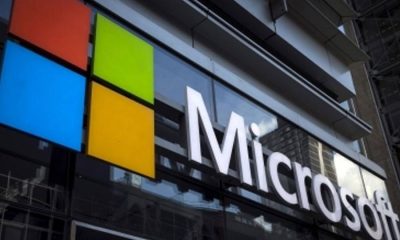Business
Big Tech now a quarter of S&P 500 combined market cap

Microsoft is now worth a smidge more than Apple, making the Satya Nadella-led cloud software giant the world’s most valuable company. Both companies are worth about $2.5 trillion, CNN reported.
Google owner Alphabet is worth just a touch less than $2 trillion, while Amazon is valued at $1.7 trillion. Tesla, Elon Musk’s electric car giant recently passed the $ 1 trillion mark and has since surged to a market cap of about $1.25 trillion.
These five companies are now collectively worth almost $10 trillion. That’s nearly a quarter of the combined $41.8 trillion market cap of the entire S&P 500, the report said.
It’s possible that the S&P 500 could have six companies worth at least $1 trillion at the same time if Meta Platforms, the social media giant formerly known as Facebook, continues to rebound. Meta now has a market valuation of about $930 billion.
But given the continued strength in tech, it’s altogether possible that all six of these companies could soon each be worth at least $2 trillion, if not more. After all, Microsoft and Apple are knocking on the door of $3 trillion.
And other techs, such as chip leader Nvidia and China’s Tencent are moving closer to the trillion dollar market valuation mark, the report added.
It seems almost unfathomable that so many companies could be worth this much. But earnings growth for many of the top techs continues to be strong, and that is pushing prices higher, the report added.
Still, the insatiable investor appetite for trillion-dollar techs reminds some market analysts of the Nasdaq froth of the 1990s and early 2000. It could be a warning sign, it said.
“Tesla’s rally is reminiscent of Cisco’s move in 2000, a move that marked the bubble top in 2000,” said Mike O’Rourke, chief market strategist with JonesTrading, in a report this month.
O’Rourke pointed out that Cisco shares soared about 50 per cent in the first three months of 2000 and analysts at Credit Suisse predicted that Cisco would be the world’s first trillion-dollar company, the report said.
It didn’t happen. Cisco, which was worth about $550 billion at the height of tech stock mania two decades ago, is now valued at about $240 billion. Intel, another tech stock leader of the late ’90s, has struggled in the past few years and is nowhere close to its 2000 peak valuation.
It’s proof that becoming a market leader may be easier than staying a market leader. There is no guarantee that the likes of Microsoft, Apple, Amazon, Alphabet and even Tesla will stay at the top, CNN reported.
Business
Jharkhand: Robbery and firing on trader sparks shutdown in Dhanbad market

Dhanbad, Nov 10: Traders on Monday launched a massive protest after a businessman was robbed and shot at inside the government-run Market Committee complex in the Barwadda police station area in Dhanbad, Jharkhand, late Sunday evening.
The incident has caused concerns over rising crime in Jharkhand’s coal capital, prompting traders to shut all 417 shops in the market complex for the day.
The attack took place around 8.30 p.m. on Sunday when three bike-borne assailants intercepted trader Shyam Bhimsariya while he was closing his shop.
The miscreants fired at him, snatched a bag containing Rs 4 lakh, and sped off. Bhimsariya narrowly escaped the bullet, which reportedly grazed past him. The incident created panic among shopkeepers and customers, many of whom rushed to safety.
On Monday morning, hundreds of traders assembled at the main gate of the Market Committee complex, raising slogans against the administration and demanding immediate arrests. They alleged that the market, which witnesses a heavy footfall, has long been operating without proper security measures.
The Market Committee complex is one of the busiest business hubs in Dhanbad, recording a daily turnover of Rs 7-8 crore.
“We will not tolerate this kind of atmosphere where traders fear for their lives every evening,” a member of the traders’ association said, adding that if the culprits are not arrested within 48 hours, the protest may spread to other markets across the district.
BJP MP Dhullu Mahto, addressing traders, said criminals are “roaming fearlessly” in Dhanbad. “The morale of criminals has gone up due to weak policing. The police must act immediately to restore confidence among traders,” he said.
Jharia Congress MLA Ragini Singh accused the state government of complete failure on the law and order front. “When crime is discussed in the Assembly, the government remains silent. People are living in fear while criminals are dictating terms,” she remarked.
Outgoing Mayor Chandrashekhar Agarwal demanded urgent security measures in the market area, suggesting that CCTV cameras be installed. He said a permanent police post must be established to prevent the recurrence of such incidents.
Dhanbad District Chamber of Commerce president Chetan Goenka strongly condemned the attack and criticised authorities for ignoring repeated requests for better security.
“It is shocking that a market with a daily business of Rs 7-8 crore has neither CCTV surveillance nor police patrolling. Traders cannot operate under fear. The administration must take permanent measures,” Goenka said.
Business
Sensex, Nifty open in green amid positive global cues

Mumbai, Nov 10: Indian benchmark indices opened the week in the green zone on Monday, amid positive global cues and investor optimism of FII coming back to India due to loss in artificial intelligence (AI) stocks.
As of 9.25 am, Sensex was up 115 points, or 0.14 per cent at 83,331 and Nifty inched up 35 points, or 0.14 per cent to 25,521.
The broadcap indices outperformed benchmarks in terms of gains, with the Nifty Midcap 100 up or 0.37 per cent, and the Nifty Smallcap 100 adding 0.27 per cent.
Asian Paints, L&T and Hindalco were among the major gainers in the Nifty Pack, while losers included Trent, Apollo Hospitals, Max Healthcare, Maruti Suzuki and Dr Reddy’s Labs.
Nifty IT, Metal and Pharma were among the biggest sectoral gainers, adding 0.56 to 0.79 per cent. All the sectoral indices were trading in the green except Nifty Media.
Analysts said that FIIs, particularly the hedge funds, who have been consistently selling in India and taking money out for playing the AI trade, are now likely to pause and slowly reverse the AI trade in favour of non-AI trade in countries like India.
“The strong earnings growth in the US has been a fundamental support that pushed up AI stock valuations to elevated valuations. Countries regarded as AI winners such China, South Korea and Taiwan also have benefited from this AI rally,” said market watchers.
Analysts noted that there are signs of this AI trade losing steam as evidenced by the 3 per cent decline in Nasdaq last week. If this healthy trend persists without high volatility, it will make the US market robust, preempting a bubble formation and its eventual burst, they added.
Further, Wall Street stocks gained as reports suggested the longest shutdown of the US Federal Government might end.
The US markets ended in the green zone in the last trading session, as Nasdaq dipped 0.22 per cent, the S&P 500 added 0.13 per cent, and the Dow inched up 0.16 per cent.
Most of the Asian markets were trading in the green during the morning session. While China’s Shanghai index lost 0.03 per cent, and Shenzhen dipped 0.59 per cent, Japan’s Nikkei added 1.04 per cent, while Hong Kong’s Hang Seng Index added 0.57 per cent. South Korea’s Kospi jumped 3.04 per cent.
On Friday, foreign institutional investors (FIIs) sold equities worth Rs 4,889 crore, while domestic institutional investors (DIIs) were net buyers of equities worth Rs 1,787 crore.
Business
Navi Mumbai: CIDCO’s 9.6-Km Kharghar Coastal Road Work To Begin In 2026, Promises Faster NMIA Connectivity By 2029

Navi Mumbai: Construction of the much-anticipated Kharghar Coastal Road — a key link that will enhance connectivity to the upcoming Navi Mumbai International Airport (NMIA) — is expected to commence in early 2026, following the receipt of mandatory forest clearances.
Planned by the City and Industrial Development Corporation (CIDCO), the 9.678-kilometre-long and 30-metre-wide arterial road will connect the airport to major nodes such as Belapur and Nerul, significantly improving regional mobility and supporting economic growth across Navi Mumbai.
The project will also provide direct high-speed access to the International Corporate Park (ICP) being developed on the lines of Bandra Kurla Complex (BKC), the Golf Course, and the FIFA-standard Centre of Excellence (COE) at Kharghar.
A grade-separated interchange over the Sion-Panvel Expressway is part of the plan to ensure smooth traffic flow and reduce congestion between the airport and nearby business and recreational hubs.
Of the total road length, 6.96 kilometres will be newly developed, while the remaining portion will integrate with the existing network. The corridor will also cater to the anticipated transport demand from upcoming projects such as the Water Transport Terminal and Pradhan Mantri Awas Yojana (PMAY) housing schemes in the area.
CIDCO has awarded the construction contract to the J Kumar–J M Mhatre Joint Venture. Officials said the project will not only boost airport connectivity but also strengthen Kharghar’s position as a major residential and commercial hub, linking it seamlessly to Taloja and Navde.
“Known for its well-planned infrastructure, green cover, and educational institutions, Kharghar is poised to witness a new phase of growth once the coastal road becomes operational. Kharghar coastal road is estimated to be ready by 2029 if everything goes as per plan,” an official from CIDCO said.
-

 Crime3 years ago
Crime3 years agoClass 10 student jumps to death in Jaipur
-

 Maharashtra1 year ago
Maharashtra1 year agoMumbai Local Train Update: Central Railway’s New Timetable Comes Into Effect; Check Full List Of Revised Timings & Stations
-

 Maharashtra1 year ago
Maharashtra1 year agoMumbai To Go Toll-Free Tonight! Maharashtra Govt Announces Complete Toll Waiver For Light Motor Vehicles At All 5 Entry Points Of City
-

 Maharashtra1 year ago
Maharashtra1 year agoFalse photo of Imtiaz Jaleel’s rally, exposing the fooling conspiracy
-

 National News1 year ago
National News1 year agoMinistry of Railways rolls out Special Drive 4.0 with focus on digitisation, cleanliness, inclusiveness and grievance redressal
-

 Maharashtra12 months ago
Maharashtra12 months agoMaharashtra Elections 2024: Mumbai Metro & BEST Services Extended Till Midnight On Voting Day
-

 National News1 year ago
National News1 year agoJ&K: 4 Jawans Killed, 28 Injured After Bus Carrying BSF Personnel For Poll Duty Falls Into Gorge In Budgam; Terrifying Visuals Surface
-

 Crime1 year ago
Crime1 year agoBaba Siddique Murder: Mumbai Police Unable To Get Lawrence Bishnoi Custody Due To Home Ministry Order, Says Report
















